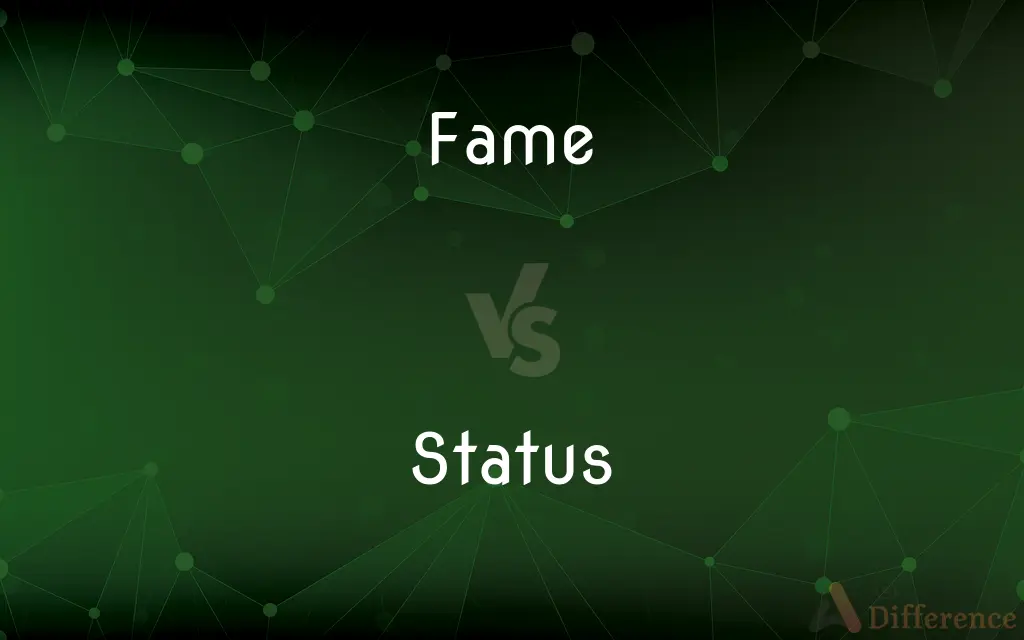Fame vs. Status — What's the Difference?
By Tayyaba Rehman & Urooj Arif — Updated on March 11, 2024
Fame is widespread recognition and public attention, related to achievements in entertainment, sports, or other fields, while status denotes one's position or rank within a social hierarchy, influenced by factors like wealth, occupation, and education.

Difference Between Fame and Status
Table of Contents
ADVERTISEMENT
Key Differences
Fame is typically associated with celebrities, artists, athletes, and other individuals who have gained public recognition and admiration through their talents, accomplishments, or media presence. Status, on the other hand, is a measure of one's social standing and can be attributed to various factors including, but not limited to, professional success, family background, education, and wealth. It reflects the respect, honor, and influence a person holds within specific social circles or society at large.
While fame often brings a certain level of status due to visibility and public admiration, high status does not necessarily equate to fame. For instance, individuals in positions of power, successful professionals, or members of the elite may have high status without being widely recognized by the general public. Fame is more about the breadth of recognition, while status is about the depth of respect and influence within particular contexts.
The pursuit and impact of fame and status can differ significantly. Fame can lead to opportunities, financial gain, and a platform for influence, but it may also come with challenges like loss of privacy and public scrutiny. Status can provide social privileges, professional opportunities, and a sense of belonging in certain communities, but might also foster competition and social pressure to maintain or elevate one's position.
Fame is about how well-known a person is, often related to their achievements or media presence, while status is about their relative position within a social hierarchy, influenced by a broader range of factors including wealth, occupation, and societal values.
Comparison Chart
Definition
Public recognition and attention.
Position or rank within a social hierarchy.
ADVERTISEMENT
Influenced by
Achievements, media presence, public interest.
Wealth, occupation, education, family background.
Scope
Can be global and transcends cultural boundaries.
Often specific to particular communities or societies.
Relationship
Can contribute to status but is not synonymous.
High status may not necessarily lead to fame.
Impact
Opportunities and scrutiny.
Social privileges and pressures.
Compare with Definitions
Fame
Brings public attention.
With fame came an overwhelming amount of public scrutiny.
Status
Social or professional standing.
His status in the academic community was unrivaled.
Fame
Widespread recognition.
The artist gained fame with her groundbreaking work.
Status
Reflects respect and influence.
She held a status that commanded respect among her peers.
Fame
Often related to entertainment or sports.
His fame grew rapidly after winning the championship.
Status
Can vary across cultures.
Status symbols differ significantly from one culture to another.
Fame
Achieved through talent or media.
Social media has become a new avenue to fame for many.
Status
Influenced by various factors.
Wealth and education significantly contributed to their status.
Fame
Can be fleeting or enduring.
Despite the fleeting nature of fame, some legacies last forever.
Status
Maintained through social networks.
Networking is key to maintaining status in many industries.
Fame
The state of being widely known, widely recognized, or of great popular interest
A singer of international fame.
Status
Relative social or professional position; standing
An improvement in the status of women
Fame
Public estimation; reputation
A politician of ill fame.
Status
The situation at a particular time during a process
An update on the status of the bill
Fame
(Archaic) Rumor.
Status
Position relative to that of others; standing
Her status is that of a guest.
Fame
To make renowned or famous.
Status
High standing; prestige
A position of status in the community.
Fame
(Archaic) To report to be
"The fancy cannot cheat so well / As she is famed to do" (John Keats).
Status
(Law) The legal character or condition of a person or thing
The status of a minor.
Fame
Something said or reported; gossip, rumour.
Status
The state of affairs; the situation
What is the status of the negotiations?.
Fame
One's reputation.
Status
A person’s condition, position or standing relative to that of others.
Superstition is highly correlated with economic status.
Fame
The state of being famous or well-known and spoken of.
Status
Or high standing.
Fame
(transitive) to make (someone or something) famous
Status
A situation or state of affairs.
What's the status of the investigation?
New York is known for its status as a financial center.
Fame
Public report or rumor.
The fame thereof was heard in Pharaoh's house.
Status
(legal) The legal condition of a person or thing.
Fame
Report or opinion generally diffused; renown; public estimation; celebrity, either favorable or unfavorable; as, the fame of Washington.
I find thou art no less than fame hath bruited.
Status
The state (of a Canadian First Nations person) of being registered under the Indian Act.
He is a status Indian.
Fame
To report widely or honorably.
The field where thou art famedTo have wrought such wonders.
Status
(social networking) A function of some instant messaging applications, whereby a user may post a message that appears automatically to other users, if they attempt to make contact.
I'm just about to update my status to "busy".
Fame
To make famous or renowned.
Those Hesperian gardens famed of old.
Status
(medicine) Short for status asthmaticus.}}
Fame
The state or quality of being widely honored and acclaimed
Status
State; condition; position of affairs.
Fame
Favorable public reputation
Status
The relative position or standing of things or especially persons in a society;
He had the status of a minor
The novel attained the status of a classic
Atheists do not enjoy a favorable position in American life
Status
A state at a particular time;
A condition (or state) of disrepair
The current status of the arms negotiations
Common Curiosities
Are fame and status permanent?
Both can be transient and subject to change based on societal values and individual circumstances.
Is fame always positive?
Fame can have both positive and negative aspects, including opportunities and public scrutiny.
How is status measured?
Status is often measured by factors like occupation, education, wealth, and social connections.
How do cultural differences affect status?
Cultural values and norms play a significant role in determining what is considered high status.
How do people lose fame or status?
Loss of fame or status can occur due to changes in public interest, professional setbacks, or social changes.
Can someone have status without fame?
Yes, many people have high status within their fields or communities without being widely famous.
Can fame lead to a change in status?
Fame can elevate a person's status by increasing their visibility and influence.
Do fame and status always bring happiness?
While they can provide opportunities and privileges, they do not guarantee personal fulfillment.
Is social media blurring the lines between fame and status?
Social media can amplify fame and influence perceptions of status, making the lines more fluid.
Can status be inherited?
Yes, status can be inherited through family background, though individual actions also play a role.
Share Your Discovery

Previous Comparison
Finable vs. Fineable
Next Comparison
Leniency vs. MercyAuthor Spotlight
Written by
Tayyaba RehmanTayyaba Rehman is a distinguished writer, currently serving as a primary contributor to askdifference.com. As a researcher in semantics and etymology, Tayyaba's passion for the complexity of languages and their distinctions has found a perfect home on the platform. Tayyaba delves into the intricacies of language, distinguishing between commonly confused words and phrases, thereby providing clarity for readers worldwide.
Co-written by
Urooj ArifUrooj is a skilled content writer at Ask Difference, known for her exceptional ability to simplify complex topics into engaging and informative content. With a passion for research and a flair for clear, concise writing, she consistently delivers articles that resonate with our diverse audience.
















































